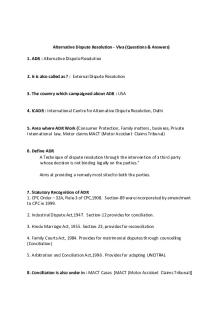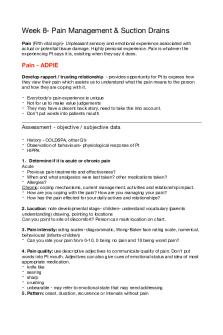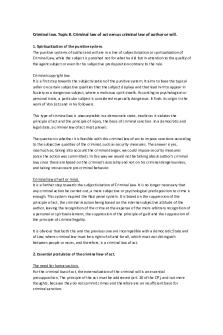Pre-Court Requirements, ADR & Conciliation - Lecture notes 8 PDF

| Title | Pre-Court Requirements, ADR & Conciliation - Lecture notes 8 |
|---|---|
| Author | Sarah Kristelly |
| Course | Family Law |
| Institution | Victoria University |
| Pages | 11 |
| File Size | 299.7 KB |
| File Type | |
| Total Downloads | 25 |
| Total Views | 146 |
Summary
Mr Ainsworth's lecture 3 notes for s1B1. Topics covered: Mediation and pre-court certificates
First return and case assessment conferences
Conciliations...
Description
Pre-Court Requirements, ADR & Conciliation: Alternative Dispute Resolution in Family Law Mandatory Requirements Family Dispute Resolution What are the Advantages of Family Dispute Resolution What are the Disadvantages of Family Dispute Resolution Mediation Section 60I Certificate Failure to Make a Genuine Effort Purpose & Effect Attendance & Participation Inappropriate to Continue Applications that do not Require a Section 60I Certificate Other Types of Mediation & ADR Pre-Action Procedures for Financial Cases Court Events What is the First Court Event? What is a ‘First Return Date’? First Return at FCC: Directions Hearing Conciliation Conference Duty of Disclosure Case Assessment Conference What is a Case Assessment Conference? Objectives of CAC Suitability of a CAC Documents Required for a CAC Next Steps After CAC Pre-Trial Conference
Page. 83 Page. 83 Page. 83 Page. 83 Page. 84 Page. 84 Page. 84 Page. 86 Page. 86 Page. 86 Page. 86 Page. 86 Page. 87 Page. 87 Page. 88 Page. 88 Page. 88 Page. 88 Page. 89 Page. 90 Page. 90 Page. 90 Page. 90 Page. 91 Page. 91 Page. 91 Page. 92
82 | P a g e
Alternative Dispute Resolution in Family Law:
The family law system places a strong focus on alternative methods for resolving disputes without the need for judicial intervention. Dispute resolution can take place in two different contexts within the family law system: 1. Within the Court system – such as conciliation conferences in relation to property disputes, interim family consultant reports; and 2. Outside the Court system – through accessing dispute resolution service providers (private or government funded).
Mandatory Requirements:
In both the Family Court and Federal Circuit, it is a mandatory requirement to file a certificate from a Family Dispute Resolution Practitioner with any application for parenting orders. s 60I: (1) The object of this section is to ensure that all persons who have a dispute about matters that may be dealt with by an order under this Part (a Part VII order ) make a genuine effort to resolve that dispute by family dispute resolution before the Part VII order is applied for. (2) …[T]he requirements for dispute resolution that must be complied with before an application is made to the Family Court of Australia for a parenting order. Exceptions? No certificate is required: If the application for orders is made by joint consent: s 60I(9)(a) If the court is satisfied that there are reasonable grounds to believe that there has been child abuse or family violence: s 60I(9)(b) If the matter is urgent: s 60I(9)(d) If applying for an exemption, the applicant must file an Affidavit of Non-filing of Family Dispute Resolution Certificate.
Family Dispute Resolution:
FDR is a process like mediation or conciliation which attempts to assist separating couples resolve their disputes without going to Court. These services can be provided by Family Relationship Centres, private counsellors, psychologists and community organisations. All FDR providers must be registered. Generally, the discussions, proposals or counter proposals that take place during FDR are confidential and cannot be used later in Court.
What are the Advantages of Family Dispute Resolution?
Gives parties greater ability, flexibility & creativity to make their own decisions in reaching an agreement Parties have more control over the process Significantly reduces the financial and emotional costs of legal proceedings 83 | P a g e
Less adversarial and therefore more conducive to ongoing co-parenting arrangements Less delays than Court proceedings
What are the Disadvantages of Family Dispute Resolution?
Non-binding No imposition of a solution, so dispute may remain unresolved
Mediation:
As per the ‘Australian Mediation Association’ website: Mediation is a process by which a neutral third party called a mediator helps people in conflict negotiate a mutually acceptable agreement. The parties to the mediation control the outcome. Mediator facilitates communication, promotes understanding, assists the parties to identify their needs and interests, and uses creative problem solving techniques to enable the parties to reach their own agreement. Unlike court or arbitration, no one imposes a solution on a party. If all of the parties do not agree to the result, the dispute remains unresolved. Mediation gives parties much more control over the way their dispute or difference is dealt with and over the outcome. If negotiations have so far failed, mediation provides an alternative to pursuing litigation or other more formal processes. The scope for solutions is usually greater than the remedies available in courts and tribunals, or even in prolonged negotiation.
Section 60I Certificates:
The Family Law Act requires that parents that are not in agreement about their child’s parenting arrangements must attend mediation, and obtain a Certificate of Attendance (Section 60I Certificate) before an Application for a parenting Order, can be made to the Court. Where there is a dispute over parenting issues it is mandatory for parents to provide a s60I Certificate (unless one of the exceptions applies) A s60I Certificate is issued by a family dispute resolution practitioner and will identify a reason for the issuing of the certificate: (a) One of the parties failed to attend the mediation; or (b) The FDRP considered that circumstances were not appropriate for Family Dispute Resolution; or (c) The parties made a genuine effort to resolve the dispute; or (d) One or both parties did not make a genuine effort to resolve the dispute; or (e) The parties attended mediation but in the FDRP’s opinion the circumstances were not appropriate for mediation to continue. FDRPs are not required to provide the Court with any additional information (including reasons) about why they have issued a particular certificate.
84 | P a g e
The Family Law Act 1975 and the Family Law (Family Dispute Resolution Practitioners) Regulations 2008 are the two main legislative instruments governing the use of s60I certificates. From 1 March 2009, Family Dispute Resolution Practitioners have been able to issue an additional type of certificate, stating that the Family Dispute Resolution (mediation) started, but the practitioner considered that it would not be appropriate to continue.
85 | P a g e
Failure to Make a Genuine Effort:
“Genuine effort” to attend and/or participate in the process is not defined in the FLA and is given a broad meaning. Failure to make a genuine effort can result in the court ordering further FDR and/or take such non-genuine attempts into account when determining costs
Purpose & Effect:
Section 60I certificates serve the sole purpose of allowing people to file an application in court. This should be clearly explained to clients as well as any consequences attached, such as courts may award costs against a party on the basis of failure to attend or not making a genuine effort. Family Dispute Resolution Practitioners (“FDR’s”) cannot amend the wording of a certificate and there is no ability to record comments on the certificate. FDR’s are not required to provide the Court with any additional information (including reasons) about why they have issued a particular certificate
Attendance & Participation:
In a circumstance where a certificate is issued to Person A due to Person B’s refusal to attend FDR, and Person B then initiates FDR through a different FDR’s and Person A refuses to attend that process, a second ‘failure to attend’ certificate can be issued. Multiple certificates may be issued in relation to one dispute. Practitioners should be mindful about whether a party’s refusal to attend is due to financial circumstances but that party has a genuine interest in attending FDR. A FDR does not need to speak with all parties before deciding that the matter is not appropriate to be dealt with through the process. “Genuine effort”, as per making a genuine effort to attend and/or participate in the process is to be given a broad scope/meaning. Failure to make a genuine effort can result in the court ordering further FDR and/or take such non-genuine attempts into account when determining costs.
Inappropriate to Continue:
An FDR practitioner can issue a section 60I certificate to cover the situation where it becomes apparent during the course of the FDR that it would be inappropriate to continue. For example, where a history of violence impacts on a person's ability to negotiate is not picked up during the intake process but becomes apparent during FDR, the practitioner may decide to stop the process and issue a certificate. On the certificate, the FDR practitioner is only required to indicate that FDR is inappropriate. Practitioners are not required to provide any reason why it is inappropriate. Communications to FDR practitioners are not admissible in court proceedings, except in cases of child abuse where the court cannot obtain the information through other sources.
Applications That do not Require a s60I Certificate:
Financial orders only Property settlement (even if there are children) 86 | P a g e
Hague Abduction Convention orders Child support departure
Other Types of Mediation & ADR:
Child-inclusive mediation Lawyer assisted mediation Barrister-facilitated mediation Collaborative Practice Commenced in Australia in 2005 Involves a multidisciplinary approach to resolving disputes and involves lawyers, psychologists, financial planners and accountants Face to face negotiations between the parties and their lawyers
Pre-Action Procedures for Financial Cases:
Unlike with applications for parenting orders, there is no mandatory requirement to attend mediation or FDR. However, under the Family Law Rules 2004, both parties are expected to have conducted some pre-action procedures with the view to exploring areas of resolution and to narrow the issues that require judicial adjudication. The Family Law Rules require parties to genuinely try to resolve their dispute before starting a case (see Rule 1.05 and Schedule 1). Parties that fail to comply risk cost consequences.
87 | P a g e
Court Events: What is the First Court Event?
This will depend on: 1. Whether the Application was filed in the Federal Circuit Court or Family Court; and 2. Whether the Application relates to parenting issues or financial issues or parenting and financial issues. Federal Circuit Court: Directions Hearing in the Duty List Conciliation Conference Family Court: Case Assessment Conference (CAC)
What is a ‘First Return Date’?
As per ‘Anderson Solicitors’ website: Once a person files an application for parenting or financial matters in the Federal Circuit Court or Family Court, a first hearing is set for the case. The first hearing set in a case is known as the “first return date”. The time in which it takes to get that first hearing will depend on the urgency of the matter but is usually 4-6 weeks. The first return date is the first time the parties and their legal representatives appear before the Judge in court. At this stage of the matter, limited evidence is before the court and so the court will not finalise the case on that day. This means that the Judge will not be making final decisions in respect to matters such as what each party’s entitlement to property is or any final living arrangements for children. The first return date will generally deal with urgent matters such as location and recovery of missing children or an injunction stopping someone from selling property. Orders made at a first return date are known as interim orders and are largely procedural. Interim orders provide a path for the matter to move forward such as for the parties to exchange relevant information, value important assets and for the next court date to be set. There doesn’t always have to be an argument in court on the first return date. Agreement can be reached between the parties prior to or on the first return date about interim issues in which case the Judge can make the agreed set of court orders.
First Return at FCC: Directions Hearing:
The first court hearing after a party files an application is referred to as the ‘first return date’ The time in which it takes to get that first hearing will depend on the urgency of the matter but is usually 4-6 weeks.
88 | P a g e
The first return date is the first time the parties and their legal representatives appear before a judicial officer at court. At this stage of the matter, limited evidence is before the court and so the court will not finalise the case on that day. The first return date will generally deal with urgent matters such as location and recovery of missing children or an injunction stopping someone from selling property. The Court will allocate a first court date when you file your documents. This is usually referred to as a ‘duty list’. On this day, the Court may: Give directions; Approve proposed consent orders; Conduct an interim hearing; Finalise the application; Fix a date for an interim or final hearing. The first court date also provides you with an opportunity to define the issues in dispute and, if possible, reach an agreement. The conduct of proceedings on the first court date is fully detailed in Rules 10.1 to 10.03. Orders made at a first return date are known as interim orders and are largely procedural. Interim orders provide a path for the matter to move forward such as for the parties to exchange relevant information, value important assets and for the next court date to be set. At the first court date the Court may give directions, order the parties to family dispute resolution, fix a date of hearing, conduct an interim hearing or finally determine the application. Rule 10.01 details the manner in which the Court may conduct proceedings on the first court date. The parties and their legal representatives, if represented, are required to attend Court and must have a good knowledge of the case. Applications that relate to property may be sent to a conciliation conference prior to the date fixed for the hearing of the application. Applications that relate to children's matters may be ordered to family dispute resolution at either the Family Court or a community based organisation prior to the date fixed for the hearing of the application. The Court will generally fix a date for the final hearing of the application at the first court date. The Federal Circuit Court aims to hear all cases within six months of filing. Note: Children under 18 years are not permitted in the Court room
Conciliation Conference:
Applications that relate to financial matters are set down for a Conciliation Conference. Conciliation Conferences provide the parties with an opportunity to reach agreement about all or some of the issues in dispute. Like mediation, conciliation is a voluntary, flexible, confidential, and interest based process. The parties seek to reach an amicable dispute settlement with the assistance of the conciliator, who acts as a neutral third party. The main difference between conciliation and mediation proceedings is that, at some point during the conciliation, the conciliator will be asked by the parties to provide them with a non-binding settlement proposal. A mediator, by contrast, will in most cases and as a matter of principle, refrain from making such a proposal. These conferences are convened and presided over by a Registrar of the Court. A conciliation conference in family law is like a Court -supervised mediation for people trying to resolve their property settlement. It helps the parties to understand what the Court and Judge might do if they cannot agree and provides all parties with a 'reality check’. 89 | P a g e
Conciliation is a voluntary proceeding, where the parties involved are free to agree and attempt to resolve their dispute by conciliation. The process is flexible, allowing parties to define the time, structure and content of the conciliation proceedings. These proceedings are rarely public. They are interest-based, as the conciliator will when proposing a settlement, not only take into account the parties' legal positions, but also their; commercial, financial and / or personal interests.
Duty of Disclosure:
All parties to a family law dispute are required to provide each other all information relevant to the issues in the case. In addition to the general disclosure requirements, there are specific rules about full and frank disclosure in financial cases (see Rules 13.04 & 13.05 Family Law Rules 2004). Parties must provide full and frank disclosure of all relevant financial information at least 7 days prior to the conciliation conference. Penalties for failure to provide disclosure: Court may refuse that party to rely on the information/document that was not disclosed; Court may stay or dismiss part of the proceedings; Cost order.
Case Assessment Conference: What is a Case Assessment Conference?
The case assessment conference is the first major event for applications filed in the Family Court involving. It provides an opportunity for the parties to reach an agreement, with the help of a registrar. If parties cannot agree, the registrar will: Assess and clarify the main issues of disagreement and the facts of the case; Consider the information you each need to provide about the areas of disagreement and disputed facts; Where appropriate, recommend other services that might help settle the dispute (for example, further family dispute resolution or progression to a hearing); and Explain what will happen next. If either party has lawyers, they will participate in the conference.
Objectives of CAC: 1. 2. 3. 4.
To identify the main issues in dispute; To identify the issues relevant to each party; To assist the Parties identify the court processes and procedures; To engage the Parties in order to try and resolve and facilitate an early settlement – if possible; 5. To identify special needs and/or issues of urgency (maintenance, access, etc.); 6. To reduce the time/costs of both the Parties and courts.
Suitability of a CAC: 90 | P a g e
Case conferences occur when the process has been initiated through the Family Court. Applications initiated through the Federal Circuit Court will be addressed by the ‘First Return Date, not a CAS. Applications initiated through the Family Court may be transferred to the Federal Circuit Court (lower jurisdiction) if it is deemed appropriate – i.e. complexities, asset pool, etc. Other circumstances are deeded inappropriate to be addressed via a CAS: IVO’s/personal safety orders are in place; Family/domestic violence is a factor; One of the parties is domiciled in another state/country, or has availability issues; and Time constraints prevent the CAS occurring – i.e. late filing of the application in the Family Court.
Documents Required for a CAC:
Each party has a duty of disclosure and must provide the Court and each other party all information relevant to an issue in the case. At least two days before the first court date each party must exchange with the other parties copies of the following documents:
Tax Returns Superannuation
Financial Statements<...
Similar Free PDFs

ADR - Lecture notes 10
- 4 Pages

ADR- Notes
- 156 Pages

ADR Exam Prep notes
- 149 Pages

8 - Lecture notes 8
- 21 Pages

8 - Lecture notes 8
- 21 Pages

ADR
- 10 Pages

366099222 ADR Notes pdf
- 9 Pages

ADR NOTES 4th semester
- 70 Pages

ADR Viva QS - ADR VIVA
- 7 Pages

8 Midwifery - Lecture notes 8
- 3 Pages

Taxation 8 - Lecture notes 8
- 2 Pages

Week 8 - Lecture notes 8
- 6 Pages

Dox 8 - Lecture notes 8
- 21 Pages

Lesson 8 - Lecture notes 8
- 2 Pages
Popular Institutions
- Tinajero National High School - Annex
- Politeknik Caltex Riau
- Yokohama City University
- SGT University
- University of Al-Qadisiyah
- Divine Word College of Vigan
- Techniek College Rotterdam
- Universidade de Santiago
- Universiti Teknologi MARA Cawangan Johor Kampus Pasir Gudang
- Poltekkes Kemenkes Yogyakarta
- Baguio City National High School
- Colegio san marcos
- preparatoria uno
- Centro de Bachillerato Tecnológico Industrial y de Servicios No. 107
- Dalian Maritime University
- Quang Trung Secondary School
- Colegio Tecnológico en Informática
- Corporación Regional de Educación Superior
- Grupo CEDVA
- Dar Al Uloom University
- Centro de Estudios Preuniversitarios de la Universidad Nacional de Ingeniería
- 上智大学
- Aakash International School, Nuna Majara
- San Felipe Neri Catholic School
- Kang Chiao International School - New Taipei City
- Misamis Occidental National High School
- Institución Educativa Escuela Normal Juan Ladrilleros
- Kolehiyo ng Pantukan
- Batanes State College
- Instituto Continental
- Sekolah Menengah Kejuruan Kesehatan Kaltara (Tarakan)
- Colegio de La Inmaculada Concepcion - Cebu

